
Risks
Scope & Guideline
Connecting Academia with Industry Insights
Introduction
Aims and Scopes
- Risk Management in Finance and Insurance:
The journal emphasizes research on risk management strategies within financial institutions and insurance companies, exploring methodologies for assessing and mitigating various forms of financial risk. - Impact of Digitalization on Risk Assessment:
There is a significant focus on how digital technologies and innovations, such as artificial intelligence and big data analytics, influence risk assessment and management practices. - Corporate Social Responsibility (CSR) and Financial Risks:
The integration of CSR into financial strategies is a recurring theme, examining how firms can manage risks associated with their social and environmental responsibilities. - Macroeconomic Risks and Financial Stability:
Research also includes studies on macroeconomic factors affecting financial stability, particularly in relation to global economic shifts and crises. - Behavioral Aspects of Risk:
The journal addresses the psychological dimensions of risk-taking and decision-making, particularly how investor behavior influences market dynamics and financial outcomes. - Regulatory Frameworks and Risk Management:
There is a consistent exploration of how regulatory changes impact risk management practices within financial markets and institutions.
Trending and Emerging
- Integration of AI and Machine Learning:
There is a growing trend towards the application of artificial intelligence and machine learning techniques in risk assessment and management, highlighting their potential to enhance predictive accuracy and efficiency. - Sustainability and Environmental Risks:
Research focusing on sustainability, climate change, and environmental risks is increasingly prominent, as organizations recognize the importance of these factors in long-term risk management strategies. - Impact of COVID-19 on Risk Management Practices:
The ongoing analysis of the COVID-19 pandemic's impact on risk management practices is a significant emerging theme, exploring how organizations adapt to unprecedented challenges. - Behavioral Finance and Risk Perception:
The intersection of behavioral finance and risk perception is gaining attention, as researchers investigate how psychological factors influence risk-taking behavior in financial markets. - Regulatory Technology (RegTech) and Compliance Risks:
With the rise of digital solutions in regulatory compliance, research on RegTech and its implications for managing compliance risks is becoming increasingly relevant.
Declining or Waning
- Traditional Risk Models:
There has been a noticeable decline in research focused on traditional risk modeling techniques, as newer methodologies and technologies become more prominent in the field. - Static Risk Assessment Methods:
Static approaches to risk assessment are becoming less common, with a shift towards dynamic and adaptive models that better reflect the complexities of modern financial environments. - Generalized Insurance Models:
Research on generalized models for insurance pricing is waning, likely due to the increasing complexity and specificity of insurance products that require more tailored approaches. - Historical Analysis of Risk Events:
While historical analysis remains important, there is a diminishing emphasis on retrospective studies of past risk events, as the focus shifts towards predictive analytics and forward-looking strategies. - Single-Dimensional Risk Factors:
The exploration of single-dimensional risk factors is declining, giving way to multi-dimensional analyses that account for the interconnectedness of various risk elements.
Similar Journals

China Finance Review International
Navigating the Future of Finance in China and BeyondChina Finance Review International (ISSN: 2044-1398; E-ISSN: 2044-1401) is an esteemed journal published by Emerald Group Publishing Ltd, located in the United Kingdom. With a commendable Q1 ranking in the field of finance according to 2023 category quartiles, this journal has established itself as a leading platform for disseminating significant research in the realms of economics, econometrics, and finance, boasting a remarkable Scopus rank of #13 out of 317, placing it in the 96th percentile. The journal focuses on advancing the discourse surrounding financial issues related to China, making it essential reading for academics, professionals, and students eager to explore the dynamic shifts in this critical area of global finance. As it continues to bridge theoretical insights with practical applications, the China Finance Review International aims to foster a comprehensive understanding of financial mechanisms at play within one of the world's most impactful economies.
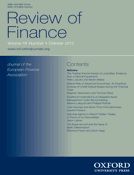
Review of Finance
Driving innovation in financial research and practice.The Review of Finance, published by Oxford University Press, stands as a premier academic journal in the fields of Finance, Accounting, and Economics. With an ISSN of 1572-3097 and an impressive track record stretching from 2001 to 2024, this journal is consistently recognized for its high-quality research, reflected in its Q1 rankings across key categories, including Accounting, Finance, and Economics and Econometrics. The Review of Finance is dedicated to advancing the understanding of financial phenomena through robust empirical and theoretical insights, making it an essential resource for researchers and professionals alike. Additionally, its strong Scopus rankings, placing it in the top percentiles, highlight its influence and relevance in ongoing academic discourse. Although the journal is not open access, it remains widely accessible through academic institutions, ensuring that its valuable contributions reach an extensive audience. The editorial board invites submissions that promise to further engage the academic community in the dynamic intersections of finance, accounting, and economic research.

Journal of Insurance Issues
Illuminating the Intersection of Theory and Practice in InsuranceJournal of Insurance Issues, published by the Western Risk & Insurance Association, stands as a pivotal platform for the exploration and dissemination of knowledge in the field of insurance and risk management. With an ISSN of 1531-6076 and an E-ISSN of 2332-4244, this journal delves into the complexities and evolving dynamics of insurance practices, policies, and theoretical underpinnings. Although not an open-access journal, it remains accessible to a broad audience, including academics, practitioners, and students eager to engage with rigorous research and innovative ideas. The journal is dedicated to enhancing understanding in critical areas such as risk assessment, regulatory impacts, insurance economics, and consumer behavior, thereby contributing significantly to the professional discourse within the insurance sector. Its robust editorial standards ensure that published works meet high-quality scholarly criteria, further establishing the journal as an essential resource for anyone interested in the multifaceted world of insurance.

Journal of Financial Market Infrastructures
Exploring the Foundations of Financial InnovationThe Journal of Financial Market Infrastructures (ISSN: 2049-5404; E-ISSN: 2049-5412), published by Incisive Media, is a premier academic journal dedicated to the evolving landscape of financial market infrastructures. With a focus on the critical examination of systems that underpin financial markets, this journal serves as a vital resource for researchers, professionals, and students alike who seek to understand the complexities and innovations in this field. Although the journal is not open access, it provides valuable, peer-reviewed content that contributes significantly to discussions surrounding market efficiency, regulatory frameworks, and technological advancements in finance. Positioned at the intersection of finance, technology, and policy, the Journal of Financial Market Infrastructures aims to disseminate cutting-edge research while fostering collaboration among scholars, practitioners, and policymakers internationally. By bridging theoretical insights with practical applications, this journal plays a crucial role in shaping the future of financial markets.
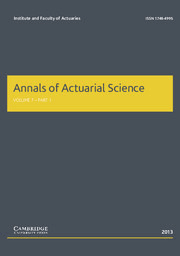
Annals of Actuarial Science
Driving excellence in actuarial practice and decision-making.Annals of Actuarial Science, published by Cambridge University Press, stands as a prominent academic journal in the fields of economics, statistics, and actuarial science. With an ISSN of 1748-4995, it features rigorous research aimed at advancing knowledge and practice in areas related to risk management, data analysis, and probability. The journal is recognized for its significant impact, holding a Q2 category ranking in both Economics and Econometrics and Statistics and Probability, along with notable positioning within Scopus rankings. Although it does not currently offer open access, its comprehensive selection of scholarly articles from 2010 to 2024 remains invaluable to researchers, professionals, and students alike, providing insights that drive the actuarial profession and enhance decision-making processes across various sectors. Positioned at the intersection of theoretical innovation and practical application, the Annals of Actuarial Science continues to shape the discourse and development of its disciplines.
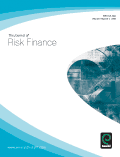
Journal of Risk Finance
Connecting theory and practice in risk finance.The Journal of Risk Finance, published by Emerald Group Publishing Ltd, is a premier academic journal dedicated to advancing the understanding of risk management and finance practices since its inception in 1999. With a strong foothold within the Q2 rankings in both Accounting and Finance categories, it proudly holds a significant place in the scholarly landscape, ranking #54 out of 317 in the Scopus Economics and Finance category, placing it in the 83rd percentile. The journal aims to facilitate the exchange of innovative research and practical insights, catering to an audience of researchers, professionals, and students eager to explore contemporary issues in risk finance. While not an open access journal, it provides numerous access options, ensuring that essential findings reach a broad readership. Set in the United Kingdom and covering publications up to 2024, the Journal of Risk Finance continues to be an indispensable resource for those committed to this critical field.

Journal of Financial Regulation
Exploring the complexities of regulatory frameworks.The Journal of Financial Regulation, published by Oxford University Press, serves as a pivotal platform for research and discourse in the field of finance and regulatory frameworks. Since its inception in 2015, this esteemed journal has captured the attention of scholars and practitioners alike, achieving a notable Q2 ranking in the finance category (as of 2023) and securing its place among the top 20% of journals in its field. With a robust focus on contemporary issues surrounding financial regulation and governance, the journal provides valuable insights and comprehensive analyses relevant to both global and local regulatory environments. Although it is not an open access journal, it offers exclusive content that is crucial for advancing knowledge in finance, evidenced by its strong performance with a Scopus rank of #65 out of 317 in the disciplines of Economics, Econometrics, and Finance. Researchers, professionals, and students are encouraged to explore the rich array of articles that contribute to the ongoing conversation in financial regulation, making it an essential resource for anyone engaged in the field.

International Journal of Financial Studies
Fostering collaboration and insight in financial studies.The International Journal of Financial Studies is a premier publication dedicated to advancing the field of finance through open-access research. Published by MDPI based in Switzerland, this journal offers researchers, professionals, and students a platform to disseminate their findings in an accessible format since its establishment in 2013. With its ISSN of 2227-7072 and a commendable impact reflected in its Q2 ranking in finance, it occupies an influential position among finance-related journals, as evidenced by its 65th percentile rank in Scopus. The journal encompasses a wide array of topics in finance, making it essential reading for those seeking to stay abreast of current research trends and methodologies. As an open-access journal, all articles are freely available, significantly enhancing the visibility and reach of published studies, which is crucial for fostering collaboration and innovation within the global financial community. Published continuously until 2024, the International Journal of Financial Studies is not just a source of knowledge; it is a critical contributor to the progression of financial scholarship.
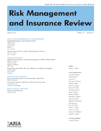
RISK MANAGEMENT AND INSURANCE REVIEW
Pioneering Research in Risk Assessment and Insurance PracticesRISK MANAGEMENT AND INSURANCE REVIEW, published by Wiley, is a vital journal for researchers and practitioners in the fields of accounting, economics, and finance. With an ISSN of 1098-1616 and an E-ISSN of 1540-6296, this journal serves as a comprehensive platform for the dissemination of cutting-edge research and insights into risk management and insurance practices. Although it does not offer an open-access model, it is recognized for its rigorous peer-review process and maintains an impactful presence within the academic community, reflected in its 2023 Scopus rankings in various disciplines, including its Q3 quartile status across multiple categories. The journal's scope addresses key contemporary issues in risk assessment, financial stability, and insurance innovation, contributing significantly to the evolving discourse in these areas. As it converges from 2006 to 2024, RISK MANAGEMENT AND INSURANCE REVIEW continues to attract a diverse readership, providing valuable resources and fostering dialogue among students, professionals, and established researchers alike.
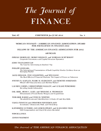
JOURNAL OF FINANCE
Shaping the future of finance through impactful research.JOURNAL OF FINANCE, published by Wiley, stands as a premier academic journal in the fields of finance, economics, and accounting. With a history dating back to 1946, the journal has consistently delivered impactful research that shapes financial theory and practice, boasting an impressive impact factor reflective of its high citation rate. Its Quartile 1 ranking in Accounting, Economics and Econometrics, and Finance illustrates its leading position within these disciplines. Although not an open access publication, the journal continues to be indispensable for researchers, professionals, and students seeking to advance their understanding and knowledge through rigorous empirical analysis and comprehensive reviews. With an esteemed global readership, the JOURNAL OF FINANCE remains committed to fostering the dissemination of innovative financial research well into 2024 and beyond.